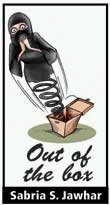Monday, 12 June 2006
By Sabria S.Jawhar
The Saudi Gazette
SAUDI ARABIA has always been proud of both its sovereignty and Islamic values, upon which the Kingdom built its constitution. It has never allowed outside pressure to influence its stand on internal or external matters. But that changed on September 11. Religious institutions in the Kingdom have come under scrutiny from the international media, with accusations of hate mongering and intolerance flying.
Among these institutes is the Commission for the Promotion of Virtue and the Prevention of Vice, also known by the English speaking media as “the religious police.” The commission has become a symbol of intolerance and is considered a breeding ground for extremism by the foreign media and some elements of Saudi society. Their methods and philosophy have been highly criticized, and some people have gone so far as to they should not be interfering in people’s privacy.
With the openness that technology has offered to the closed Saudi society, the behavior of the new generation has changed. Saudi youth live lifestyles closer to those of their counterparts in the West. Saudis are also bolder in claiming more freedom to practice, what they perceive as their right to be wild, like youth all over the world. But those newly adopted values and style of living have been faced with rejection by some religious institutes, taking the form of a never ending story of clashes between these youth and the religious police - great material for the hungry international media.
But this should not be understood as a condemnation of the religious police’s social role of keeping Saudi society’s sense of Islamic values in perspective away from sin. As a matter of fact, some Saudis are blindly supportive of the commission. But there are others who think that the commission has gone too far - not in what values the commission seeks to protect or preach, but rather the manner in which the commission goes about carrying its business.
The increasing cases of overzealous enforcement of moral codes by some members of the religious police have drawn attention to the importance of introducing rehabilitation programs to help commission members cope with changes in society around them and set a good example, when it comes to preaching and protecting the religion they are promoting.
Aware of these facts, the Saudi leadership issued a decree announced by Prince Naif Bin Abdul Aziz, Minister of Interior, and carried by the state media late on Wednesday, saying suspects apprehended by the commission must now be handed over to regular police and then questioned and tried in a court of law - Islamic law.
The commission, founded in 1979, has come under fire for playing policeman and prosecutor, even though their original mandate does provide them with this kind of jurisdiction.
The decree issued Wednesday underlined that last point on jurisdiction saying the commission’s role will end with the arrest.
This move was underestimated by some Westerners, simply because most of them are not aware of the tragedy that some of the religious police’s raids have ended with.
Here is a story of a man and a woman, not married, arrested in Makkah two days ago by the religious police after an hour long car chase.
The fear of arrest pushed the man to speed through streets and roads bustling with pedestrians, in some cases school children, just to avoid being apprehended by the religious police. That chase ended with a crash and both the man and woman ended up in the commission’s car.
Why was the man so scared about being arrested by the religious police? Did he really need to risk his life trying to run from them for possibly having his girl friend in the car? If they were more tolerant and understanding, what would that man have done?
There are other more dramatic stories, which end with the death of either the couple being chased or innocent pedestrians, which definitely can explain the wisdom behind announcing the restriction of the commission’s role to arrest only. Deep inside, I wish more restrictions were put to limit the circumstances upon which their arrests can be made, as opposed to the current practice of simply arresting people for looking suspicious.
Regardless, I am proud of this government, one that appears to be sincere and cares for the stability of its society. To me, it shows real commitment towards introducing gradual reforms in a manner that allows Saudi society to bond amongst its different fractions and keeps the social fiber intact in a manner that does not step over the provisions of Islamic values.
Thursday, December 14, 2006
Subscribe to:
Post Comments (Atom)


No comments:
Post a Comment